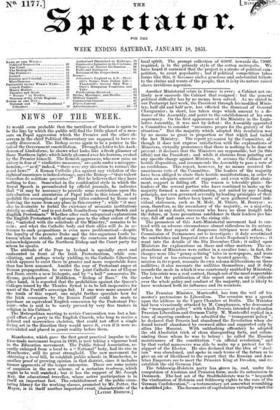Another Ministerial crisis in France is over ; a Cabinet
not en- tirely new succeeds the Cabinet that resigned : but the general political difficulty has by no means been solved. As we stated in our Postscript last week, the President through his modified Minis- try, half old and half new, has effected the dismissal of General Changarnier ; in short, has taken steps which amount to a de- fiance of the Assembly, and point to the establishment of his own supremacy. On the first appearance of his Ministry in the Legis- lative Assembly, it was met by defeat : the Assembly appointed a Committee to consider " measures proper for the gravity of the situation." But the majority which adopted this resolution was by no means so great in proportion as that which had baited the last Ministry. The report pnaented by the Committee, al- though it- does not express satisfaction with the explanations of Ministers, virtually pronounces that there is nothing to be done-at present : it declares that the Ministers are responsible, but (in this affair) not the President ; and while it abstains froth pointing out any specific charge against Ministers, it accuses the Cabinet of u hostile disposition, and recommends the Assembly to pass a vote of no confidence. This report, however, by no means received the unanimous vote of the Committee. The leaders of the majority have been obliged to abate their hostile manifestations, in order to retain an adequate amount of support ; and even with that abate- ment, support is falling off. The reason is tolerably plain : the leaders of the several parties who have combined to make up the majority formed a mere combination, not united by any leading principle, nor even governed severall;byleading principles of their own. They have rather been knots of men gathered round indi- vidual statesmen, such as M. Mole, M. Thiers, M. Berryer : as soon, therefore, as the ascendancy of the majority, as a majority, is placed in any doubt, waverers who have no clear insight into thefuture or _have precarious *eolifldence in their leaders pro- hic vice, fall off and cross over to the rising side.
The promoters of this Anti-Ministerial movement had to con- tend with an adverse circumstance almost ridiculous in its nature. When the first reports of dangerous intrigues were afloat, the Commission of Permanence sat to investigate : it duly scrutinized the sandwiches and Imperial cries at Louis Napoleon's reviews ; it went into the details of the Dix Decenibre Club ; it called upon Ministers for explanations on these and other matters. The ex- planations of Ministers were rather in a cavalier tone ; in fact, the charges were like " penny-a-lining" tales in newspapers, and were too trivial or too extravagant to be treated gravely. The Com- mission in its report, recounts its own solemn deliberations on these nullities ; it also recounts the nullifies themselves ; and it duly records the mode in which it was courteously snubbed by Ministers. The late crisis was a real contest, though not of the most respeetable order ; but the publication of this report casts an air of ridicule over the whole policy and conduct of the majority, and is likely to have weakened both its influence and its numbers.


























